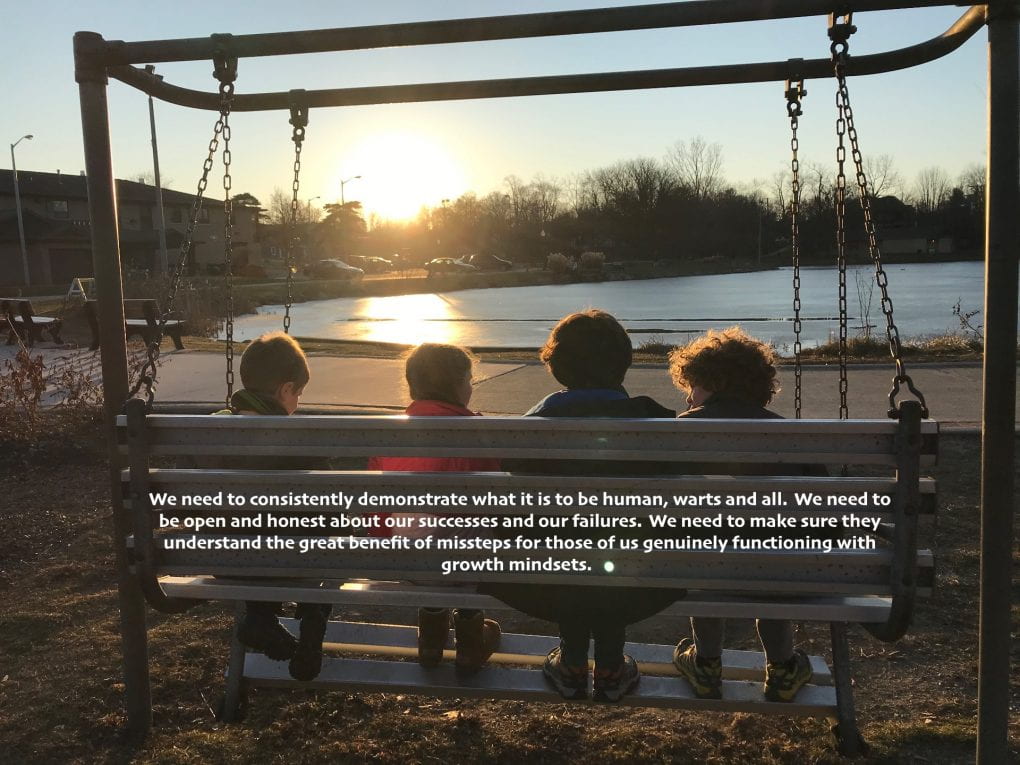Sometimes I Kick Myself (And I’m Ok With It)
I often feel that I’m much better principal than I am a dad. I never (and would never) shout at school, and to be clear, I don’t go around the house shouting all the time, but over the course of ten year and four kids I’ve been there.
I kick myself when I shout at our kids. When my frustrations bubble over and burst through it feels like I’m failing.
The reality is that there are times I need to step away from being Dad and be alone for bit. There I times I just need to be me, quietly, calmly, and in isolation. I need time outs.
In those moment, those thoughts, actions, feelings and words are tough to process and I’m really hard on myself. The fact is, I love our kids dearly and I show them that love each day, even when I’m not at my best. I couldn’t live without them and I wouldn’t trade my life with them for anything. Parent tend to be really hard on themselves for being human. I’m no exception.
I don’t think raising kids is about stifling our emotions or energy. Instead, I think it’s about continuously working to enhance our ability to regulate and restore, and maybe even more importantly, I think it’s about being open, honest, transparent, and compassionate about who and what we are.
I think our kids benefit from experiencing our humanity if we’re intentional about providing them a comprehensive and developmentally appropriate view, with the communication and support for processing it.
I read an article this weekend that highlights Social Emotional Learning (SEL) skills in a way that really connects with the core values that Lorelei and I share. The author starts with, “Social and emotional learning (SEL) skills aren’t core content but they’re the core of all content.”
We’ve had, and continue to have lots of dialogue around SEL in our home. The consistent theme is that there’s nothing more important to than giving our kids tools and strategies for managing their emotions and their relationships, and providing them with modeling and opportunities to practice regulating and restoring as we celebrate the triumphs and face the challenges together.
We use the Zones of Regulation (http://www.zonesofregulation.com). Being a Hero at school (or being your best self at home) in every Zone is the baseline for everything else we do. The reality that all of us, kids and adults alike, sometimes find ourselves in each of the four Zones of Regulation (BLUE – sad with low energy, GREEN – focused and ready to learn, YELLOW – worried or silly, and RED – angry with “out of control” energy) binds us with common threads and makes it possible for us to connect with our kids as we tread the SEL path together.
Transparency is critical along the path. As we shift through the Zones throughout each day we talk with kids about our practice. We work hard to demonstrate the difference between being a frustrated person and simply being frustrated, being an angry person and being just angry, being a sad person and being sad in the moment.
When we share our stories with our kids, and with one another we make visible, and open minds and hearts to tools and strategies that have the potential to enhance lives. When kids and others can see that our energy and emotions fluctuate and are influenced buy our circumstances and experiences, just like theirs do and are, bonds of genuine trust and compassion are developed and resilience is built.
We tend to remember moments of discovery in visceral ways. Revelation moves us. One of the great challenges we have as parents and educators is that it’s really tough to measure growth in some areas. There’s no straight forward assessment that monitors the development of SEL skills. We see kids shift and change over long periods of time, we witness the ebbs the flows, and we share stories with colleagues and parents around our amazement about how Billy “has grown” or what a “mature attitude” Susan has developed about her learning, but the real-time impact of our efforts are often undetectable.
Kids simply don’t blossom on our watch. Even so, our work with them, our dedication to them, and our love for them are all incredibly impactful. What we do and how we act catalyzes discovery. They’re watching. They’re listening to everything we say. They’re learning from their experiences with us.
We need to consistently demonstrate what it is to be human, warts and all. We need to be open and honest about our successes and our failures. We need to make sure they understand the great benefit of missteps for those of us genuinely functioning with growth mindsets.
SEL isn’t about getting it “right” all the time or walking through this world with a smile on our faces at every turn. SEL is about having the wherewithal to weather the storms. None of us are perfect at it. Kids should know that we don’t expect them to be either. They should know that, in fact, we expect just the opposite. They should understand that we expect their roads to be long and winding, just like ours are, and that we’re here to help as they learn to navigate. Let’s stay focused on the core of what it takes to teach the core. SEL first.
In it together for the kids!
Live. Love. Listen. Learn. Lead. Thanks.

As always, Seth- insightful, thought provoking and helpful.
Carry on!!
Thank you so much, Debbie! I greatly appreciate your encouragement. I hope you’re having a wonderful weekend!